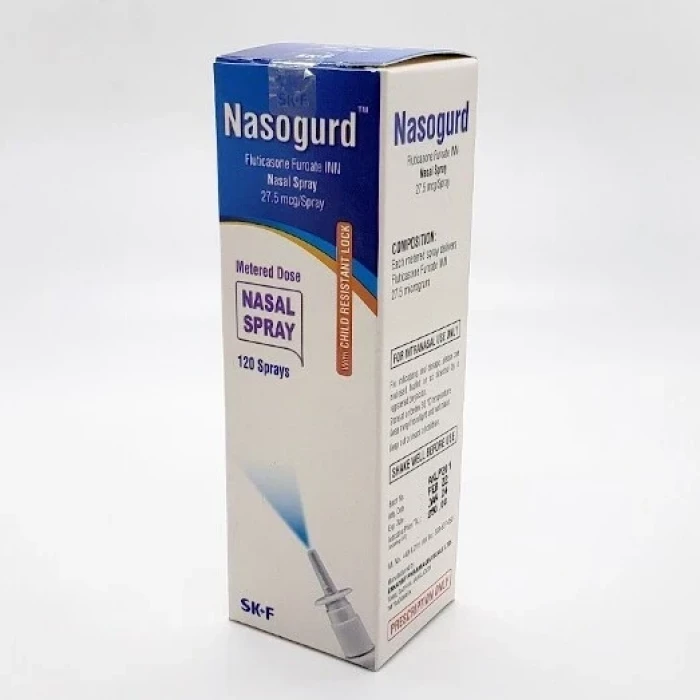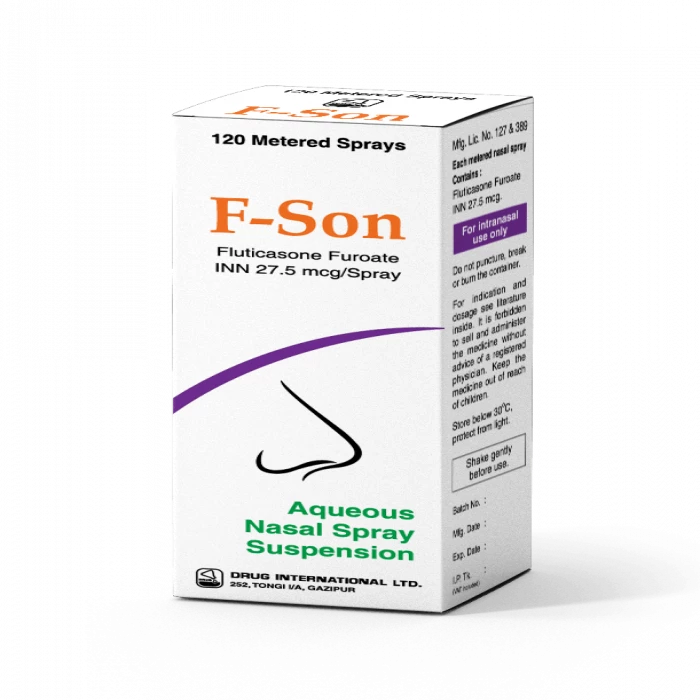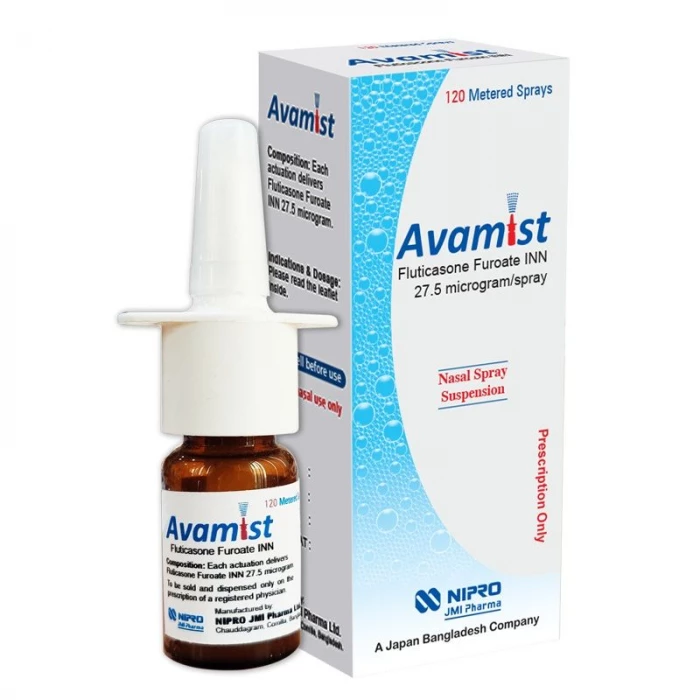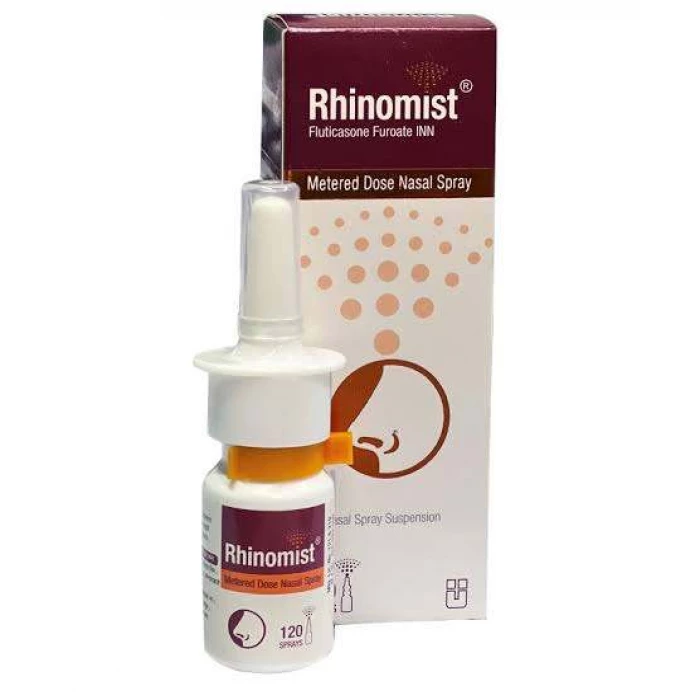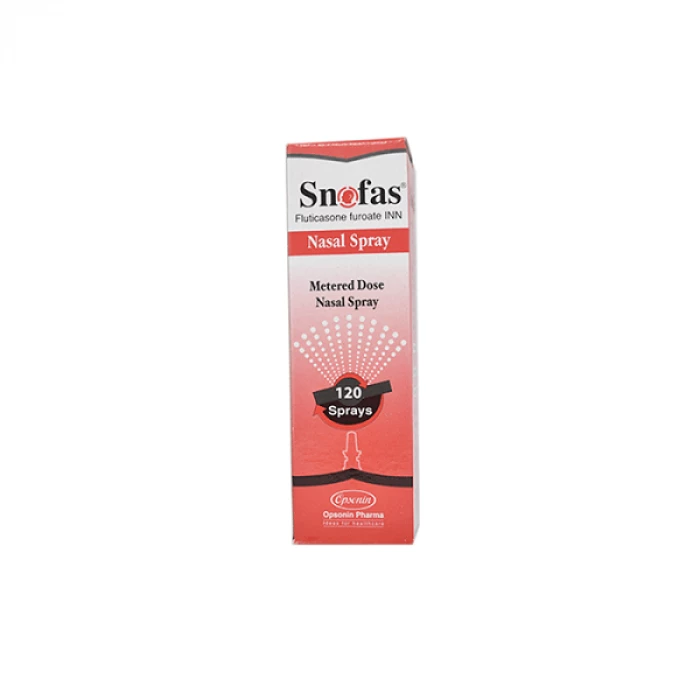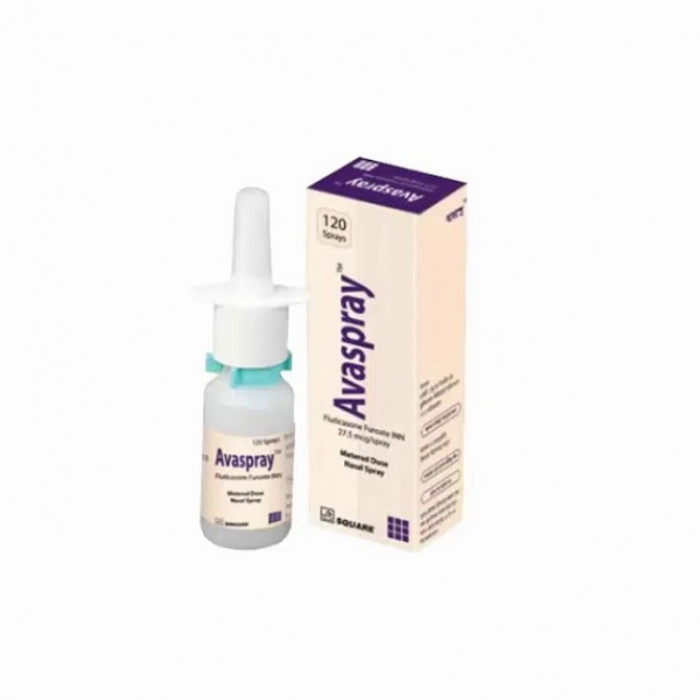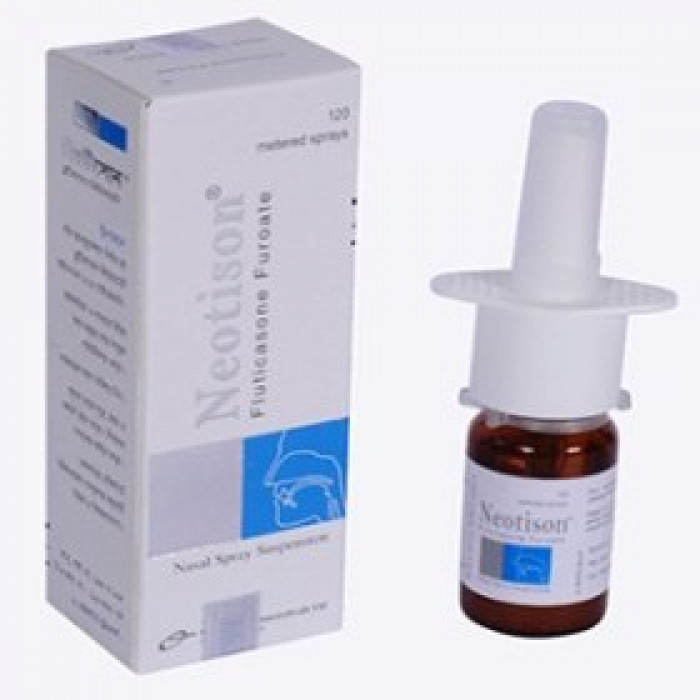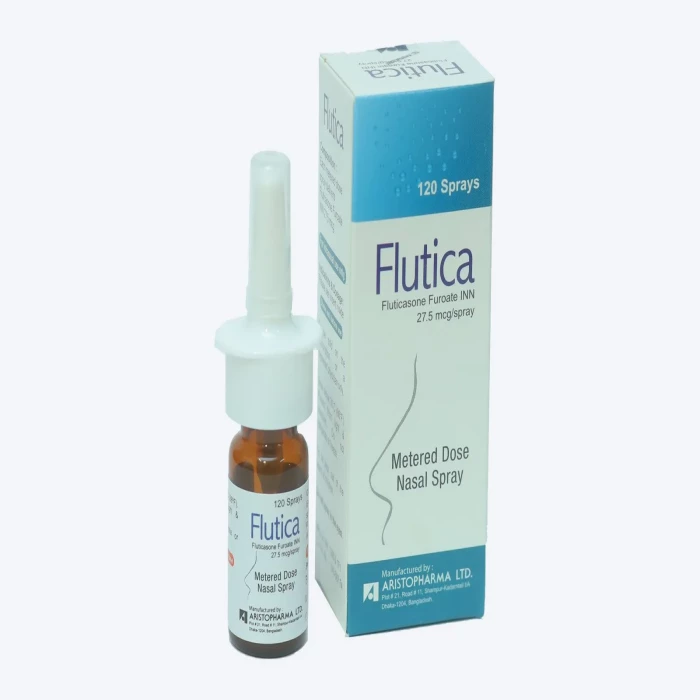
✔ 100% Authentic Product
👁️ Currently Viewing 3380
Fluticasone Furoate nasal spray is indicated for the treatment of the symptoms of seasonal and perennial allergic rhinitis in patients aged 6 years and older.
Discount
Price: ৳ 264
MRP:
৳
278
5%
Off

100% Genuine Products, Guaranteed

Safe & Secure Payments, Always

Fast, Secure & Efficient Delivery

Proper Packaging
 Cash on Delivery - All over Bangladesh
Cash on Delivery - All over Bangladesh Regular Delivery - 12-24 Hours, Dhaka City* Charge Tk.39-59
Regular Delivery - 12-24 Hours, Dhaka City* Charge Tk.39-59 Regular Delivery - 24-48 Hours, Other Cities* Charge Tk.99-110
Regular Delivery - 24-48 Hours, Other Cities* Charge Tk.99-110
 ফ্রি ডেলিভারিঃ - ৯৯৯ টাকা+ অর্ডারে, ঢাকা
শহরে
ফ্রি ডেলিভারিঃ - ৯৯৯ টাকা+ অর্ডারে, ঢাকা
শহরে ফ্রি ডেলিভারিঃ - ২৯৯৯ টাকা+ অর্ডারে, ঢাকার
বাহিরে
ফ্রি ডেলিভারিঃ - ২৯৯৯ টাকা+ অর্ডারে, ঢাকার
বাহিরে
100% Genuine Products, Guaranteed
Safe & Secure Payments, Always
Fast, Secure & Efficient Delivery
Proper Packaging
 Cash on Delivery - All over Bangladesh
Cash on Delivery - All over Bangladesh Regular Delivery - 12-24 Hours, Dhaka City* Charge Tk.39-59
Regular Delivery - 12-24 Hours, Dhaka City* Charge Tk.39-59 Regular Delivery - 24-48 Hours, Other Cities* Charge Tk.99-110
Regular Delivery - 24-48 Hours, Other Cities* Charge Tk.99-110 ফ্রি ডেলিভারিঃ - ৯৯৯ টাকা+ অর্ডারে, ঢাকা
শহরে
ফ্রি ডেলিভারিঃ - ৯৯৯ টাকা+ অর্ডারে, ঢাকা
শহরে ফ্রি ডেলিভারিঃ - ২৯৯৯ টাকা+ অর্ডারে, ঢাকার
বাহিরে
ফ্রি ডেলিভারিঃ - ২৯৯৯ টাকা+ অর্ডারে, ঢাকার
বাহিরে
✅ Description:
Flutica Nasal Spray is a corticosteroid medication utilized to alleviate symptoms linked with asthma, such as narrowed and swollen airways leading to breathing difficulties, and allergic rhinitis, which presents with symptoms like sneezing, runny nose, and itchy or watery eyes due to allergic reactions triggered by histamine release.
While using Flutica Nasal Spray, you may experience side effects such as dryness and irritation of the nose and throat, an unpleasant taste or smell, headache, fever, and nosebleeds. If any of these side effects become bothersome or persist, it is advisable to inform your doctor promptly. Additionally, Flutica Nasal Spray can weaken your immune system, potentially increasing the risk of acquiring or exacerbating infections. Therefore, it is essential to maintain proper hygiene practices and avoid close contact with individuals who are sick or have infections.
Flutica Nasal Spray is available in both nasal spray and inhaler forms. The appropriate dose, duration, and form of Flutica Nasal Spray will be determined by your doctor based on the specific condition being treated. It is crucial to follow your doctor's instructions carefully when using this medication.
It is not recommended to use Flutica Nasal Spray in children below 6 years of age. Before using Flutica Nasal Spray, inform your doctor if you have any pre-existing medical conditions such as heart, kidney, liver, eye, or vision problems, or if you have been diagnosed with infections like tuberculosis.
Safety Advices

Alcohol
UNSAFE
No interaction was found. However, it is advisable not to take or limit alcohol as a precautionary measure.

Pregnancy
CONSULT YOUR DOCTOR
Flutica Nasal Spray is not recommended for use during pregnancy as it may cause harm to the fetus. Consult your doctor before taking this medicine.

Breastfeeding
CONSULT YOUR DOCTOR
Flutica Nasal Spray is not recommended for use during breastfeeding. It is not known whether this medicine is excreted in human breast milk. If you are breastfeeding, consult your doctor before taking this medicine. It should not be used in breastfeeding women unless advised clearly necessary by the doctor.

Driving
SAFE
Flutica Nasal Spray is unlikely to affect your ability to drive and use machines.

Kidney
CONSULT YOUR DOCTOR
Flutica Nasal Spray should be used with caution in patients with severe hepatic impairment. Consult with your doctor before using.

Liver
CONSULT YOUR DOCTOR
Flutica Nasal Spray should be used with caution in patients with severe hepatic impairment. Consult with your doctor before using.
✔️ Uses of Flutica Nasal Spray
- Allergic Rhinitis
✔️ How does Flutica Nasal Spray work?
Flutica Nasal Spray works by blocking the release of histamine, a chemical that causes allergic reactions. Thus it helps in relieving allergic symptoms.
✔️ Side Effects of Flutica Nasal Spray
- Nausea and vomiting
- Sore throat
- Headache
- Cough
- Unusual tiredness and weakness
- Blurred vision
- Bloody nose
- Burning, itching, and irritation of the skin
✔️ Quick Suggestions:
- Furamist Nasal Spray is used in the treatment of asthma (as second-line treatment) and allergic rhinitis.
- Use this medicine as advised by your doctor. Do not use it more or fewer times than prescribed.
- Furamist Nasal Spray may take a few days or weeks to show its effect.
- Do not stop using it without consulting your doctor. Consult the doctor if you experience any undesirable side effects.
- Avoid driving vehicles or operating machines after using this medicine as it may cause blurred vision.
- Inform your doctor if you are pregnant, planning a pregnancy, or are breastfeeding before using this medicine.
- Inform your doctor about all your current medications and other health conditions before starting the treatment with Furamist Nasal Spray.
- Keep away from the reach of children and pets. Ensure that the unused medicine is disposed of properly.
✔️ Indication of Flutica Nasal Spray
Fluticasone Furoate is used in the treatment of sneezing and runny nose due to allergies.
✔️ Pharmacology
Fluticasone Furoate is a synthetic trifluorinated corticosteroid renowned for its potent anti-inflammatory activity. Similar to other corticosteroids, Fluticasone Furoate exerts its effects across various cell types such as mast cells, eosinophils, neutrophils, macrophages, and lymphocytes. It also influences multiple mediators involved in inflammation, including histamine, eicosanoids, leukotrienes, and cytokines.
✔️ Dosage of Flutica Nasal Spray
Fluticasone Furoate Nasal Spray:
- Adults & Children over 12 years: Administer 2 sprays in each nostril once daily. In certain cases, 2 sprays into each nostril twice daily may be warranted, with a maximum of 4 sprays per day.
- Children aged 2-11 Years: Utilize 1 spray in each nostril once daily. Patients should adhere to a regular dosing schedule as directed, as the effectiveness of Fluticasone Furoate nasal spray hinges on consistent use.
- Children under 2 years of age: There is insufficient data to support the use of Fluticasone Furoate Nasal Spray for treating seasonal or perennial allergic rhinitis in children under 2 years of age.
✔️ Administration of Flutica Nasal Spray
- Shake the bottle well before using the medication.
- Ensure that your nose is adequately cleaned before administering the medicine.
- Insert the bottle tip into one nostril while keeping the other nostril closed.
- Aim the spray towards the sides of your nostril, away from the central cartilage dividing the two sides of your nose.
- Breathe out gently through your mouth while administering the spray.
- Repeat the same process for the other nostril.
✔️ Interaction
The interaction with alcohol is not well-known. It is advisable to consult your doctor before consuming alcohol while using this medication.
Furamist Nasal Spray may interact with medications such as Mifepristone, Clarithromycin, Ketoconazole, and Omacetaxine. It's essential to discuss all medications you're taking with your doctor before starting Furamist Nasal Spray.
Disease Interactions:
- Hyperadrenocorticism: Caution is advised when using Furamist Nasal Spray in individuals with high levels of adrenal hormones. High doses of the spray may lead to menstrual irregularities, acne, etc.
- Infections: Individuals with latent or active infections should use Furamist Nasal Spray cautiously, as it can suppress the immune system and potentially worsen the condition.
- Ocular Herpes Infection: Furamist Nasal Spray should be used cautiously in individuals with ocular herpes simplex infections, as it may damage the outer layer of the eye (cornea) and exacerbate the condition.
- Eye Problems: Those with eye issues like cataracts, glaucoma, or increased intraocular pressure should use Furamist Nasal Spray with extreme caution, as prolonged use may lead to blindness.
- Osteoporosis: Individuals with osteoporosis should use Furamist Nasal Spray cautiously, as prolonged use may lead to loss of bone density and worsen the condition.
- Liver Disease: Caution is advised when using Furamist Nasal Spray in individuals with liver disease due to the increased risk of severe side effects. Regular monitoring of liver function may be necessary.
✔️ Contraindications
Fluticasone Furoate nasal spray is contraindicated in patients with a hypersensitivity to any of its ingredients.
✔️ Pregnancy & Lactation
Use in pregnancy: Pregnancy category C. There are no adequate and well-controlled studies in pregnant women. Fluticasone Furoate nasal spray should be used during pregnancy only if the potential benefit justifies the potential risk of the fetus.
Use in lactation: It is not known whether Fluticasone Furoate is excreted in human breast milk. However, since other corticosteroids have been detected in human milk, caution should be exercised when Fluticasone Furoate is administered to a nursing woman.
✔️ Precautions & Warnings
Rarely, immediate hypersensitivity reactions or contact dermatitis may occur following the administration of Flutica nasal spray. Additionally, rare instances of wheezing, nasal septum perforation, cataracts, glaucoma, and increased intraocular pressure have been reported with the intranasal application of corticosteroids, including Flutica. While systemic effects have generally been minimal with recommended doses of Flutica nasal spray, there is an increased potential risk with larger doses. Therefore, it is advisable to avoid doses larger than recommended.
Regarding use in special populations:
Geriatric Use: Dose selection for elderly patients should be cautious due to the greater frequency of decreased hepatic, renal, or cardiac function, as well as concomitant diseases or other drug therapies.
Use in Hepatic Impairment: Flutica should be used with caution in patients with severe hepatic impairment.
Use in Renal Impairment: No dosage adjustment is required in patients with renal impairment.
✔️ Storage Conditions:
Store below 30°C
⚠️Disclaimer:
At ePharma, we’re committed to providing accurate and accessible health information. However, all content is intended for informational purposes only and should not replace medical advice from a qualified physician. Please consult your healthcare provider for personalized guidance. We aim to support, not substitute, the doctor-patient relationship.




